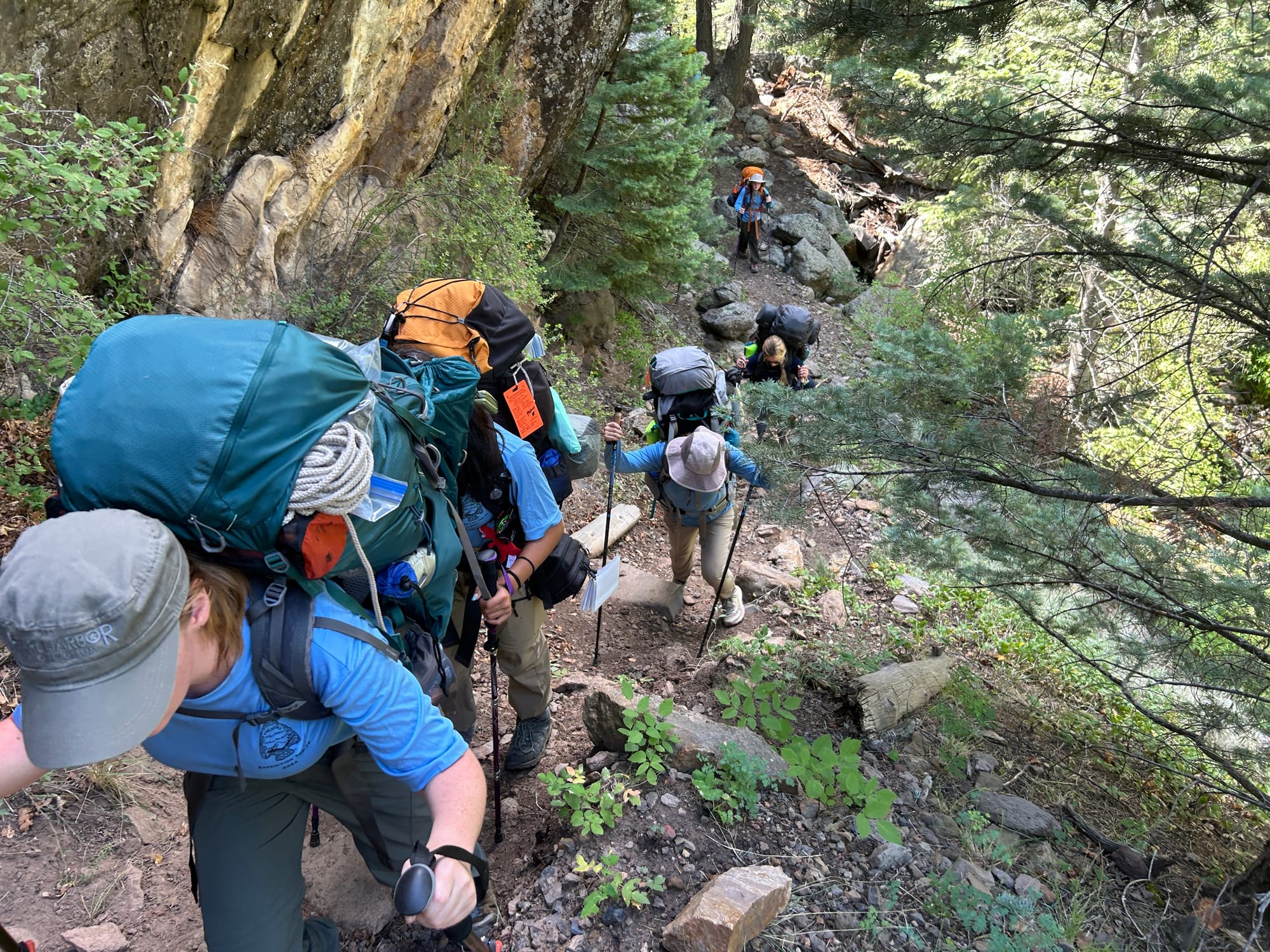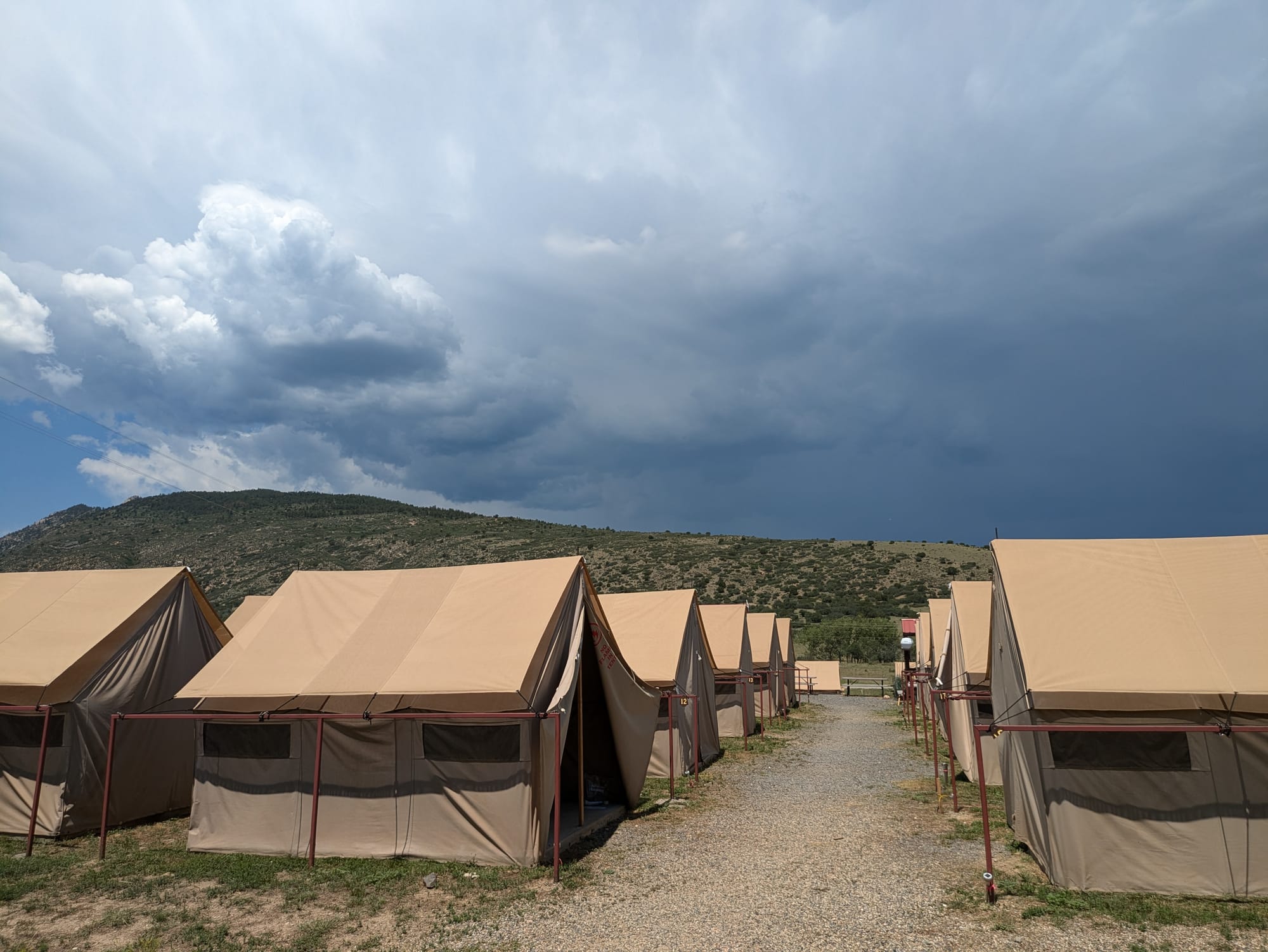Heather Compton, San Antonio Texas

Philmont Reflection Thoughts
- Adult leader in charge needs to plan hikes/campouts even if they can not attend. The group needs to be able to function under any leadership.
- Pack shakedowns need to happen every-other month to ensure items are well fitting and repairs are made.
- Shoes: try different styles of shoes. If you keep getting blisters in the same spot every time, it is the wrong shoe for you.
- Travel itinerary: make one and stick to it. The group needs to travel as a group. Vehicles should not go ahead because you can not check in until your group has fully arrived.
- Arrival to Philmont: bring a daypack with water everywhere at base camp.
- Troop gear needs to be evenly distributed among all. Ensure each individual has a basketball-size space in their bag.
- Makeup and skin care routines should be discouraged because of smellables.
- Phones should not be permitted by youth.
- If members are unable to participate in preparation hikes they should not be allowed to participate. (Unless it is a lone scout not connected to the group.)
- Leaders must step back and let the Scouts lead.
My trip to the infirmary
On a trail called the "Stairmaster", on the side of a mountain that goes up about 2 feet with each step forward, I was unable to expand my lungs. This caused a mild panic attack and hyperventilation, which led to dizziness. I sadly chose to go back to camp. The ranger did not persuade me either way. The ranger instructed the group to press on forward to the next camping location. (Thankfully it was a straight path for several miles.) The ranger escorted me back to the last staffed camp. Along the way we encountered another group that had 2 doctors as the adult leaders. They were able to triage me and use sat phones to contact basecamp. That group decided to stop for lunch to assist. My ranger went ahead to meet up with 2 Philmont staff that were sent to recover me. The doctor group’s ranger (Laura) stayed with me and sent her group ahead. When my ranger returned with the 2 staff members, they triaged me once again and communicated with base camp. Base camp decided I should come off trail.
The 2 Philmont staffers began walking me back to the nearest staff camp while my ranger and Laura returned to the 2 crews. Rain started 20 minutes into this walk and quickly turned to hail. My rain jacket was not easily accessible. One staffer held my umbrella while I and the other staffer hid under my rain skirt. A one point the hail was too intense to walk and we had to stand and wait. The nearby mountain was covered in hail and appeared white with snow. I wish I had taken a picture, but I was afraid I would ruin my phone. When the rain eased up we began walking again. The trail quickly turned into a river about 3 inches deep. One staffer fell twice due to the fast-moving water and muddy trail conditions. The small creek we had crossed earlier that morning was now a raging river. We had to hurry across the bridge due to flash flood warnings.
We arrived at the 1900’s homestead, but it has no electricity or furnace. We filled the house with smoke as we attempted to start a fire in the woodstove. I changed into dry clothes in the outhouse, then sat on the porch for over 2 hours waiting for the basecamp pickup. (I could not breathe properly inside the smoke-filled house.) Then I rode to basecamp.
I was taken to the infirmary to be triaged again, then transferred to Infirmary Tent City (ITC,) I had to carry my backpack and food tray from the mess hall all the way to the ITC. On an Aireal view Philmont, the ITC is in the top-right corner. It's a long walk for someone sick. They gave me a towel and bar of soap and asked that I take a shower before bed in order to keep the tents clean. It was past lights out before I got to bed.
The next morning everyone is awoken at 0515 with orders to be on the porch at 0600. From there each adult and youth in ITC had to sign out to go to breakfast. We were the first to be fed as we had to be back at the Infirmary for rounds. Each participant spoke with a doctor and a med student. They determined if you were able to return to trail or must wait. From there we went straight to ITC to sign back in and begin cleaning the bathrooms. Everyone was assigned a chore. Often the lines were long at the Infirmary and others did your chores. After chores, if the doctor released you to go back to trail, you had to pack up your gear and wait on the porch for a ride. You would be taken to the location your crew was heading to that night. The day you go back to the trail you are not allowed to hike. This also means you can only be returned to a staffed camp as you can not be alone in the woods. If your crew is not going to a staff camp, your trip ends and you remain in ITC until your crew comes to collect you. Youth were only allowed to leave ITC for meals. In the evening, they have a 2-hour period of free time where you can go to the trading post area. Adults could sign out and sign back in as they pleased. The staffer in charge of ITC would give daily admonitions that everyone should rest (rather than run around all day) so that they could go back on the trail. Everyday was like Groundhog day - I stared at the Tooth of Time waiting for my crew to return.
Final thoughts
- I would like to go back to Philmont if my body can handle the altitude. The pace is fast - there is so much I did not get a chance to see.
- Group dynamics is a challenge - some individuals do not perform as well with others. This was a growth experience for us.
- You should consider all medical complications each person has when participating in these events.

